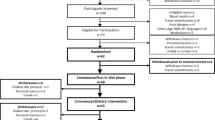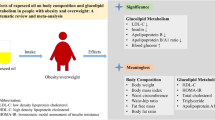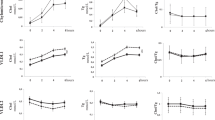Abstract
Objective:
To compare the individual effects of dietary α-linolenic acid (ALA), eicosapentaenoic acid (EPA) or docosahexaenoic acid (DHA) on low-density lipoprotein (LDL) fatty acid composition, ex vivo LDL oxidizability and tocopherol requirement.
Design, setting and subjects:
A randomized strictly controlled dietary study with three dietary groups and a parallel design, consisting of two consecutive periods. Sixty-one healthy young volunteers, students at a nearby college, were included. Forty-eight subjects (13 males, 35 females) completed the study.
Interventions:
Subjects received a 2-week wash-in diet rich in monounsaturated fatty acids (21% energy) followed by experimental diets enriched with about 1% of energy of ALA, EPA or DHA for 3 weeks. The omega-3 (n-3) fatty acids were provided with special rapeseed oils and margarines. The wash-in diet and the experimental diets were identical, apart from the n-3 fatty acid composition and the tocopherol content, which was adjusted to the content of dienoic acid equivalents.
Results:
Ex vivo oxidative susceptibility of LDL was highest after the DHA diet, indicated by a decrease in lag time (−16%, P<0.001) and an increase in the maximum amount of conjugated dienes (+7%, P<0.001). The EPA diet decreased the lag time (−16%, P<0.001) and the propagation rate (−12%, P<0.01). Tocopherol concentrations in LDL decreased in the ALA group (−13.5%, P<0.05) and DHA group (−7.3%, P<0.05). Plasma contents of tocopherol equivalents significantly decreased in all three experimental groups (ALA group: −5.0%, EPA group: −5.7%, DHA group: −12.8%). The content of the three n-3 polyunsaturated fatty acid differently increased in the LDL: on the ALA diet, the ALA content increased by 89% (P<0.001), on the EPA diet the EPA content increased by 809% (P<0.001) and on the DHA diet, the DHA content increased by 200% (P<0.001). In addition, the EPA content also enhanced (without dietary intake) in the ALA group (+35%, P<0.01) and in the DHA group (+284%, P<0.001).
Conclusions:
Dietary intake of ALA, EPA or DHA led to a significant enrichment of the respective fatty acid in the LDL particles, with dietary EPA preferentially incorporated. In the context of a monounsaturated fatty acid-rich diet, ALA enrichment did not enhance LDL oxidizability, whereas the effects of EPA and DHA on ex vivo LDL oxidation were inconsistent, possibly in part due to further changes in LDL fatty acid composition.
Sponsorship:
This research was financially supported by the German Federal Ministry of Education and Research (BMBF) within the project ‘NAPUS 2000 – healthy foodstuffs from transgenic rapeseed’.
This is a preview of subscription content, access via your institution
Access options
Subscribe to this journal
Receive 12 print issues and online access
$259.00 per year
only $21.58 per issue
Buy this article
- Purchase on Springer Link
- Instant access to full article PDF
Prices may be subject to local taxes which are calculated during checkout

Similar content being viewed by others
References
Bonanome A, Biasia F, DeLuca M, Munaretto G, Biffanti S, Pradella M et al. (1996). N-3 fatty acids do not enhance LDL susceptibility to oxidation in hypertriacylglycerolemic hemodialyzed subjects. Am J Clin Nutr 63, 261–266.
Brossard N, Croset M, Pachiaudi C, Riou JP, Tayot JL, Lagarde M (1996). Retroconversion and metabolism of (13C)22:6n-3 in humans and rats after intake of a single dose of (13C)22:6n-3-triacylglycerols. Am J Clin Nutr 64, 577–586.
Brude IR, Drevon CA, Hjermann I, Seljeflot I, Lund-Katz S, Saarem K et al. (1997). Peroxidation of LDL from combined-hyperlipidemic male smokers supplied with omega-3 fatty acids and antioxidants. Arterioscler Thromb Vasc Biol 17, 2576–2588.
Burdge G, Calder PC (2005). Alpha-linolenic acid metabolism in adult humans: the effects of gender and age on conversion to longer-chain polyunsaturated fatty acids. Eur J Lipid Sci Technol 107, 426–439.
Burdge GC, Finnegan YE, Minihane AM, Williams CM, Wootton SA (2003). Effect of altered dietary n-3 fatty acid intake upon plasma lipid fatty acid composition, conversion of (13C)alpha-linolenic acid to longer-chain fatty acids and partitioning towards beta-oxidation in older men. Br J Nutr 90, 311–321.
Burdge GC, Jones AE, Wootton SA (2002). Eicosapentaenoic and docosapentaenoic acids are the principal products of alpha-linolenic acid metabolism in young men. Br J Nutr 88, 355–363.
Burdge GC, Wootton SA (2002). Conversion of alpha-linolenic acid to eicosapentaenoic, docosapentaenoic and docosahexaenoic acids in young women. Br J Nutr 88, 411–420.
Chung BH, Segrest JP, Ray MJ, Brunzell JD, Hokanson JE, Krauss RM et al. (1986). Single vertical spin density gradient ultracentrifugation. Methods Enzymol 128, 181–209.
Conquer JA, Holub BJ (1996). Supplementation with an algae source of docosahexaenoic acid increases (n-3) fatty acid status and alters selected risk factors for heart disease in vegetarian subjects. J Nutr 126, 3032–3039.
Conquer JA, Holub BJ (1997). Dietary docosahexaenoic acid as a source of eicosapentaenoic acid in vegetarians and omnivores. Lipids 32, 341–345.
Deutsche Gesellschaft für Ernährung (DGE) Österreichische Gesellschaft für Ernährung (ÖGE), Schweizerische Gesellschaft für Ernährungsforschung (SGE), Schweizerische Vereinigung für Ernährung (SVE) (2000). Referenzwerte für die Nährstoffzufuhr. 1, Auflage ed. Umschau/Braus-Verlag: Frankfurt am Main.
Emken EA, Adlof RO, Gulley RM (1994). Dietary linoleic acid influences desaturation and acylation of deuterium-labeled linoleic and linolenic acids in young adult males. Biochim Biophys Acta 1213, 277–288.
Esterbauer H, Gebicki J, Puhl H, Jürgens G (1992). The role of lipid peroxidation and antioxidants in oxidative modification of LDL. Free Radical Biol Med 13, 341–390.
Esterbauer H, Striegl G, Puhl H, Rotheneder M (1989). Continuous monitoring of in vitro oxidation of human low density lipoprotein. Free Radical Res Commun 6, 67–75.
Finnegan YE, Minihane AM, Leigh-Firbank EC, Kew S, Meijer GW, Muggli R et al. (2003). Plant- and marine-derived n-3 polyunsaturated fatty acids have differential effects on fasting and postprandial blood lipid concentrations and on the susceptibility of LDL to oxidative modification in moderately hyperlipidemic subjects. Am J Clin Nutr 77, 783–795.
Foulon T, Richard MJ, Payen N, Bourrain JL, Beani JC, Laporte F et al. (1999). Effects of fish oil fatty acids on plasma lipids and lipoproteins and oxidant–antioxidant imbalance in healthy subjects. Scand J Clin Lab Invest 59, 239–248.
Frankel EN, Parks EJ, Schneeman BO, Davis PA, German JB (1994). Effect of n-3 fatty acid-rich fish oil supplementation on the oxidation of low density lipoproteins. Lipids 29, 233–236.
Goyens PL, Spilker ME, Zock PL, Katan MB, Mensink RP (2005). Compartmental modeling to quantify alpha-linolenic acid conversion after longer term intake of multiple tracer boluses. J Lipid Res 46, 1474–1483.
Hansen JB, Grimsgaard S, Nilsen H, Nordøy A, Bønaa KH (1998). Effects of highly purified eicosapentaenoic acid and docosahexaenoic acid on fatty acid absorption, incorporation into serum phospholipids and postprandial triglyceridemia. Lipids 33, 131–138.
Harper CR, Edwards MJ, Defilipis AP, Jacobson TA (2006). Flaxseed oil increases the plasma concentrations of cardioprotective (n-3) fatty acids in humans. J Nutr 136, 83–87.
het Hof KH, Tijburg LB, de Boer HS, Wiseman SA, Weststrate JA (1998). Antioxidant fortified margarine increases the antioxidant status. Eur J Clin Nutr 52, 292–299.
Higdon JV, Du SH, Lee YS, Wu T, Wander RC (2001). Supplementation of postmenopausal women with fish oil does not increase overall oxidation of LDL ex vivo compared to dietary oils rich in oleate and linoleate. J Lipid Res 42, 407–418.
Higgins S, Carrol YL, McCarthy SN, Corridan BM, Roche HM, Wallace JMW et al. (2001). Susceptibility of LDL to oxidative modification in healthy volunteers supplemented with low doses of n-3 polyunsaturated fatty acids. Br J Nutr 85, 23–31.
Hussein N, Ah-Sing E, Wilkinson P, Leach C, Griffin BA, Millward DJ (2005). Long-chain conversion of (13C)linoleic acid and alpha-linolenic acid in response to marked changes in their dietary intake in men. J Lipid Res 46, 269–280.
International Task Force for Prevention of Coronary Heart Disease and International Atherosclerosis Society (2003). Pocket Guide to Prevention of Coronary Heart Disease. Grünwald: Bruckmeier Verlag.
Jakob E, Elmadfa I (1995). Rapid HPLC assay for the assessment of vitamin K1, A, E and beta-carotene status in children (7–19 years). Int J Vitam Nutr Res 65, 31–35.
Jialal I, Fuller CJ, Huet BA (1995). The effect of alpha-tocopherol supplementation on LDL oxidation. A dose-response study. Arterioscler Thromb Vasc Biol 15, 190–198.
Kratz M, Cullen P, Kannenberg F, Kassner A, Fobker M, Abuja PM et al. (2002). Effects of dietary fatty acids on the composition and oxidizability of low-density lipoprotein. Eur J Clin Nutr 56, 72–81.
Lepage G, Roy CC (1986). Direct transesterification of all classes of lipids in a one-step reaction. J Lipid Res 27, 114–120.
Mesa MD, Buckley R, Minihane AM, Yaqoob P (2004). Effects of oils rich in eicosapentaenoic and docosahexaenoic acids on the oxidizability and thrombogenicity of low-density lipoprotein. Atherosclerosis 175, 333–343.
Muggli R (1994). Vitamin E-Bedarf bei Zufuhr von Polyenfettsäuren. Fat Sci Technol 96, 17–19.
Nielsen NS, Pedersen A, Sandström B, Marckmann P, Høy CE (2002). Different effects of diets rich in olive oil, rapeseed oil and sunflower-seed oil on postprandial lipid and lipoprotein concentrations and on lipoprotein oxidation susceptibility. Br J Nutr 87, 489–499.
Oostenbrug GS, Mensink RP, Hornstra G (1994). Effects of fish oil and vitamin E supplementation on copper-catalysed oxidation of human low density lipoprotein in vitro. Eur J Clin Nutr 48, 895–898.
Pawlosky RJ, Hibbeln JR, Novotny JA, Salem N (2001). Physiological compartmental analysis of alpha-linolenic acid metabolism in adult humans. J Lipid Res 42, 1257–1265.
Pedersen H, Petersen M, Major-Pedersen A, Jensen T, Nielsen NS, Lauridsen ST et al. (2003). Influence of fish oil supplementation on in vivo and in vitro oxidation resistance of low-density lipoprotein in type 2 diabetes. Eur J Clin Nutr 57, 713–720.
Reaven P, Parthasarathy S, Grasse BJ, Miller E, Steinberg D, Witztum JL (1993a). Effects of oleate-rich and linoleate-rich diets on the susceptibility of low density lipoprotein to oxidative modification in mildly hypercholesterolemic subjects. J Clin Invest 91, 668–676.
Reaven PD, Khouw A, Beltz WF, Parthasarathy S, Witztum JL (1993b). Effect of dietary antioxidant combinations in humans. Protection of LDL by vitamin E but not by beta-carotene. Arterioscler Thromb 13, 590–600.
Reaven PD, Witztum JL (1996). Oxidized low density lipoproteins in atherogenesis: role of dietary modification. Annu Rev Nutr 16, 51–71.
Röschlau P, Bernt E, Gruber W (1974). Enzymatische Bestimmung des Gesamtcholesterins im Serum. Z Klin Chem Klin Biochem 12, 403–407.
Siedel J, Schmuck R, Staepels J, Town MH (1993). Long term stable, liquid ready-to-use monoreagent for the enzymatic assay of serum or plasma triglycerides (GPO-PAP-method). Clin Chem 39, 1127 (abstract).
Sørensen NS, Marckmann P, Høy CE, van Duyvenvoorde W, Princen HM (1998). Effect of fish-oil-enriched margarine on plasma lipids, low-density- lipoprotein particle composition, size, and susceptibility to oxidation. Am J Clin Nutr 68, 235–241.
Steinberg D, Parthasarathy S, Carew TE, Khoo JC, Witztum JL (1989). Beyond cholesterol. Modifications of low-density lipoprotein that increase its atherogenicity. N Engl J Med 320, 915–924.
Sugiuchi H, Irie T, Uji Y, Ueno T, Chaen T, Uekama K et al. (1998). Homogeneous assay for measuring low-density lipoprotein cholesterol in serum with triblock copolymer and alpha-cyclodextrin sulfate. Clin Chem 44, 522–531.
Sugiuchi H, Uji Y, Okabe H, Irie T, Uekama K, Kayahara N et al. (1995). Direct measurement of high-density lipoprotein cholesterol in serum with polyethylene glycol-modified enzymes and sulfated alpha-cyclodextrin. Clin Chem 41, 717–723.
Suzukawa M, Abbey M, Howe PRC, Nestel PJ (1995). Effects of fish oil fatty acids on low density lipoprotein size, oxidizability, and uptake by macrophages. J Lipid Res 36, 473–484.
Turini ME, Crozier GL, Donnet-Hughes A, Richelle MA (2001). Short-term fish oil supplementation improved innate immunity, but increased ex vivo oxidation of LDL in man – a pilot study. Eur J Nutr 40, 56–65.
Upritchard JE, Schuurman CR, Wiersma A, Tijburg LB, Coolen SA, Rijken PJ et al. (2003). Spread supplemented with moderate doses of vitamin E and carotenoids reduces lipid peroxidation in healthy, nonsmoking adults. Am J Clin Nutr 78, 985–992.
Valk EE, Hornstra G (2000). Relationship between vitamin E requirement and polyunsaturated fatty acid intake in man: a review. Int J Vitam Nutr Res 70, 31–42.
Vidgren HM, Agren JJ, Schwab U, Rissanen T, Hänninen O, Uusitupa MI (1997). Incorporation of n-3 fatty acids into plasma lipid fractions, and erythrocyte membranes and platelets during dietary supplementation with fish, fish oil, and docosahexaenoic acid-rich oil among healthy young men. Lipids 32, 697–705.
Wander RC, Du SH, Ketchum SO, Rowe KE (1996). Effects of interaction of RRR-alpha-tocopheryl acetate and fish oil on low-density-lipoprotein oxidation in postmenopausal women with and without hormone-replacement therapy. Am J Clin Nutr 63, 184–193.
Wander RC, Du SH, Thomas DR (1998). Influence of long-chain polyunsaturated fatty acids on oxidation of low density lipoprotein. Prostaglandins Leukot Essent Fatty Acids 59, 143–151.
Witztum JL, Steinberg D (2001). The oxidative modification hypothesis of atherosclerosis: does it hold for humans? Trends Cardiovasc Med 11, 93–102.
Acknowledgements
We are indebted to A Golla, E Deppe, J Grimme, J Hameister, S Irmer, S Kocksch, P Mahlstädt for their excellent work on the dietary study, and W Hanekamp, S Wentker for excellent technical assistance; to G Berger, S Venherm and M Eisenberg for performing the venipunctures; to M Kratz for helpful comments in planning the study; to Unilever Research Vlaardingen for production of the study oils and margarines; to M Delker and W Bernhard at the Bildungszentrum der Bundesfinanzverwaltung for their generous cooperation. Last but not least we thank the volunteers for their interest and participation in our study.
Author information
Authors and Affiliations
Corresponding author
Additional information
Guarantor: S Egert.
Contributors: SE participated in designing and planning the study, calculated the diets, headed the investigation during the dietary period, measured the parameters of LDL oxidizability, performed the statistical analysis and wrote the paper together with UW, who also contributed to designing and planning of the study. FK measured LDL fatty acid composition, MF measured LDL tocopherol levels and KK measured plasma tocopherol levels. UW initiated the project together with VS and HFE.
Rights and permissions
About this article
Cite this article
Egert, S., Somoza, V., Kannenberg, F. et al. Influence of three rapeseed oil-rich diets, fortified with α-linolenic acid, eicosapentaenoic acid or docosahexaenoic acid on the composition and oxidizability of low-density lipoproteins: results of a controlled study in healthy volunteers. Eur J Clin Nutr 61, 314–325 (2007). https://doi.org/10.1038/sj.ejcn.1602523
Received:
Revised:
Accepted:
Published:
Issue Date:
DOI: https://doi.org/10.1038/sj.ejcn.1602523
Keywords
This article is cited by
-
Plasma fatty acid changes following consumption of dietary oils containing n-3, n-6, and n-9 fatty acids at different proportions: preliminary findings of the Canola Oil Multicenter Intervention Trial (COMIT)
Trials (2014)
-
Effects of high-fat and low-fat diets rich in monounsaturated fatty acids on serum lipids, LDL size and indices of lipid peroxidation in healthy non-obese men and women when consumed under controlled conditions
European Journal of Nutrition (2011)



